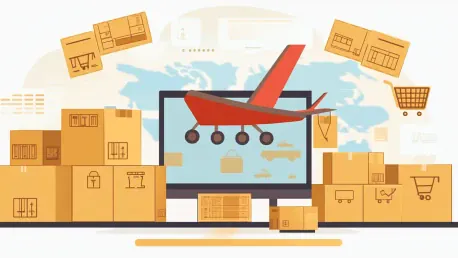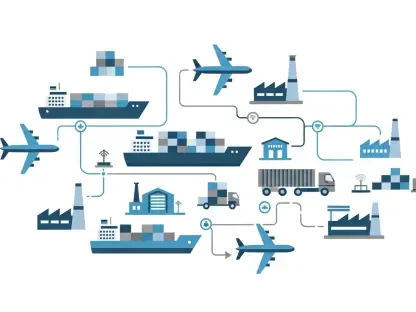The booming e-commerce sector has created a unique opportunity for airlines to expand their services into the growing field of air cargo. Over the past year, airfreight traffic has surged, driven predominantly by e-commerce, which now accounts for about 20% of global air cargo volumes. As online shopping continues to rise in popularity, predictions suggest this figure could reach 25% by 2027 and continue to rise, indicating a sustained growth trajectory. Despite their potential, airlines remain underutilized within this market, presenting a significant chance for them to capitalize on the booming industry by adapting their logistics strategies.
The Emergence of E-Tailers as Key Customers
E-tailers, seeking more direct dealings with carriers, have emerged as significant new consumers in the air cargo market. This shift marks a departure from the traditional airline-forwarder paradigm, requiring airlines to adapt to the changing logistics landscape. Unlike traditional logistics intermediaries, e-tailers prioritize end-to-end logistics solutions tailored to their specific needs, encompassing the entire journey from shipment preparation to last-mile delivery. This change represents a substantial alteration in logistics management, necessitating airlines to consider more extensive operational frameworks.
Despite the sizable opportunities presented by this new customer base, many airlines are currently not equipped to handle these comprehensive logistics requirements. E-tailers operate on a time-definite, door-to-door delivery model, which necessitates that airlines broaden their operational mindset to include ground handling and warehouse management. Denis Ilin, co-founder and CEO of e-Smart Logistics, emphasizes the necessity for airlines to move beyond merely delivering goods to airports. Efficient airline performance becomes irrelevant if goods are delayed in ground handling or warehouse facilities, requiring a shift in both strategic planning and operational execution.
Expanding Beyond Airport Boundaries
To meet the demands of modern e-tailers, airlines need to rethink their logistics strategies to include comprehensive ground operations and seamless end-to-end delivery solutions. Denis Ilin, leveraging his expertise from the Russian Postal Service and AirBridgeCargo Airlines, has a profound understanding of how to align air cargo processes with the intricate requirements of parcel logistics. His current venture, e-Smart Logistics, focuses on providing an integrated logistics solution that covers all aspects of ground operations, from shipment preparation to final mile delivery.
This involves the use of cutting-edge technology to ensure high visibility and data flow throughout the logistics process. e-Smart Logistics leverages Kale Logistics Solutions’ AvSys platform to offer a harmonious blend of customs processing, packaging management, and label generation. This comprehensive solution ensures that the data requirements for modern e-commerce logistics are met with efficiency and accuracy. The need for visibility and detailed data flow is crucial in today’s fast-paced and highly competitive logistics environment, where even minor delays can lead to significant losses in customer satisfaction and revenue.
The Role of Integrated Logistics Solutions
Integrating logistics solutions into airline operations can help overcome the limitations currently faced by many traditional airlines. By partnering with logistics providers like e-Smart Logistics, airlines can offer direct flights that bypass the conventional hub-and-spoke models used by many traditional integrators. This not only ensures faster delivery times but also allows airlines to leverage their inherent speed and cost-efficiency advantages to compete more effectively in the market.
e-Smart Logistics, with its advanced platform, provides an exemplary model of how an integrated logistics solution can function. The platform harmonizes various logistical processes, ensuring high visibility and streamlined operations. This approach is crucial for airlines looking to capture a larger share of the e-commerce market. By adopting such integrated solutions, airlines can enhance their service offerings, ensuring that the goods reach the end consumer promptly and in optimal condition. This level of service is particularly critical in the e-commerce sector, where customer expectations for quick and reliable delivery are exceptionally high.
The Competitive Edge Over Traditional Integrators
In the competitive landscape of air cargo, airlines possess inherent advantages in speed and cost that can be further leveraged to capture the growing e-commerce market. The ability to offer direct flights, bypassing traditional hub-and-spoke models, allows airlines to provide faster and more cost-effective deliveries. This capability is particularly valuable in filling empty domestic route capacities with e-commerce goods, thereby securing incremental revenues and optimizing operational efficiencies. By successfully incorporating these strategies, airlines can position themselves as virtual integrators, providing bundled logistics services directly to e-tailers and competing head-to-head with established players like FedEx and UPS.
The shift towards becoming virtual integrators is a revolutionary step that can significantly transform the air cargo market. Airlines have the potential to offer not only competitive speed but also superior service quality and cost-efficiency. This multi-faceted approach allows them to meet the growing demands of the e-commerce sector more effectively. By integrating comprehensive end-to-end logistics services, airlines can enhance their market position and capitalize on new revenue streams, positioning themselves as viable contenders in the integrator space. This transformation is also supported by advanced technological platforms and strategic partnerships in the logistics sector.
Building Global Partnerships and Networks
The success of airlines in the e-commerce logistics space hinges not only on their ability to provide integrated services but also on building robust global partnerships and networks. Companies such as e-Smart Logistics have already made significant strides in this direction, establishing partnerships across Europe, the Americas, and India. These partnerships are pivotal in providing the global coverage necessary to meet the demands of a growing e-commerce market. Ensuring seamless interaction between airline clients and their handling agents is essential for optimal data flow, visibility, and process alignment.
As the logistical framework matures, airlines may extend their reach through interline agreements, integrating partner airlines into the logistics value chain. This network expansion can enhance service offerings, enabling airlines to meet the diverse needs of e-tailers and other high-demand sectors effectively. The success of this model lies in its ability to provide a seamless logistics experience, from initial shipment to final delivery. By capitalizing on their speed and extensive route networks, airlines can optimize operations and enhance customer satisfaction across multiple markets. Building and maintaining these networks is crucial for sustaining long-term growth and capturing a substantial market share in the competitive e-commerce logistics landscape.
The Potential Beyond E-Commerce
The booming e-commerce sector has generated a significant opportunity for airlines to expand their services into the ever-growing domain of air cargo. Over the past year, there has been a remarkable surge in airfreight traffic, mostly fueled by the rise in online shopping. Currently, e-commerce accounts for around 20% of global air cargo volumes. As the trend of online shopping continues to gain momentum, projections estimate that this percentage could climb to 25% by 2027, setting a clear path for continuous growth.
Despite this promising potential, airlines are currently underutilized within the air cargo market. This underutilization presents a prime opportunity for airlines to enhance their logistics strategies and fully engage with the booming e-commerce sector. By innovating and adapting their approaches, they can seize the burgeoning opportunities in air cargo and significantly expand their market presence. As e-commerce thrives, airlines that capitalize on this trend stand to gain substantially in the evolving logistics landscape.









